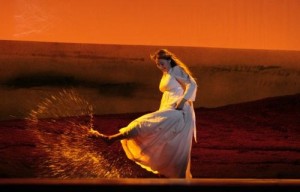Cultural Cocktail Hour
Eugene Onegin
Opera Review: The Visual Poetry of LA Opera’s “Eugene Onegin”
by Leticia Marie Sanchez
“Red sky at night, sailor’s delight; Red sky at morning, sailors take warning.” During LA Opera’s psychologically profound production of Piotr Illyich Tchaikovsky’s “Eugene Onegin,” red skies foreshadowed emotional storms, from the passion-red sky faced by Tatiana the morning after she wrote her feverish note to Onegin to the blazing landscape faced by Lensky on the morning of his fateful duel. LA Opera’s production masterfully captured the poetic spirit of Tchaikovsky’s opera, bringing the interior life of Alexander Pushkin’s characters to the foreground through sumptuous visual poetry. This beloved masterpiece has never before been performed at LA Opera. Its debut on Saturday night led by James Conlon was nothing short of world class. The visually stunning production was originally created in 2006 by the late director Steven Pimlott for the Royal Opera House, Covent Garden and was staged in Los Angeles by Francesca Gilpin. The production treated audiences to a dynamic tableau vivant, an invitation to step inside a living work of art.
It is fitting that LA Opera’s striking production is rich in visual metaphors, considering that Tchaikovsky’s opera was based on poetry, a novel-in-verse first published by Alexander Pushkin in 1833. In this work, the innovative Pushkin invented an unusual verse-form, one which has come to be known as the Onegin Stanza. Respectful of the literary source, Tchaikovsky did not refer to Eugene Onegin as an opera, but rather, as “lyrical scenes.” Tchaikovsky’s emphasis on the word lyric corresponds with LA Opera’s visually poetic interpretation, one that unearths the essence of the characters and brings them forth on stage.Peter Mumford’s lighting design evoked the vibrations of the soul, from peaceful palettes to blood-red intensity, shifting with the characters’ turbulent emotions and heightening Tchaikovsky’s expressionistic score.

In one beautifully choreographed lyrical scene in Act I, Tatiana (Oksana Dyka) gleefully basks in a translucent pond, after pouring out her heart to Onegin in a love letter. This visual image provoked a visceral understanding of her interior exhilaration.
Similarly, the starkly barren trees enhanced Lensky’s (Vsevolod Grinov) powerful rendition of “Kuda Kuda” in Act II. The symbiosis of set and vocals intensified the misery of Lensky’s alienation. Furthermore, dramatic paintings of Pietà–like human expression on the scrim heralded the beginning of each act, giving the audience visual clues to the chilling moments ahead.
In addition to the striking set, the cast of talented singers, including Slovakian baritone Dalibor Jenis as the eponymous hero, delivered an emotionally impacting performance. Oksana Dyka’s physical gestures as the girlish Tatiana were spot on. The Ukranian soprano embodied the perfect blend of innocence, conviction, and dignity as Pushkin’s noble heroine. In one of the longest arias in opera history, the letter scene, Dyka poignantly expressed the lovelorn girl’s turmoil through her pure voice. Keith Jameson’s Monsieur Triquet added a sensitivity and tenderness to the Tatiana Couplets in Act II that caused time to stand still with his interpretation.
LA Opera’s interpretation of Eugene Onegin takes audiences through the heart of Pushkin’s poetry, allowing us to hear, see, and feel its splendor all at once.
LA Opera’s performances of Eugene Onegin will take place at the Dorothy Chandler Pavilion, 135 N. Grand Avenue, Los Angeles CA 90012, on the following dates:
Wednesday, September 21, at 7:30pm
Sunday, September 25, at 2pm
Saturday, October 1, at 7:30pm
Thursday, October 6, at 7:30pm













